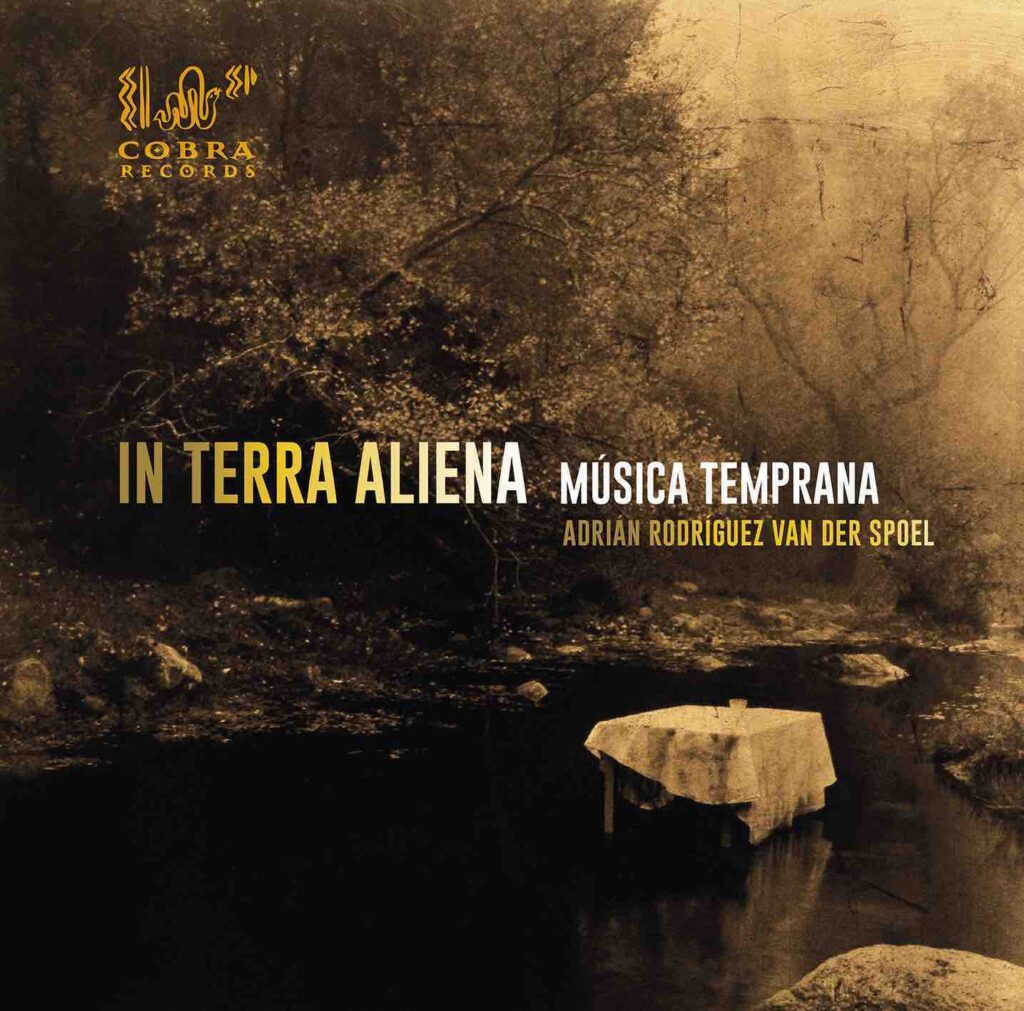Het ensemble Música Temprana brengt met In Terra Aliena een ode aan de vluchtende mens die op zoek is naar een betere leefomgeving.
English version below
Dat migratie van alle tijden is, bewijst Música Temprana op muzikaal, magistrale wijze. Onder leiding van Adrián Rodríguez van der Spoel zingt en speelt het ensemble stukken uit de Spaanse en Portugese liedboeken Cancionero Musical de Palacio en Cancionero Musical de Lisboa. Bundels uit de 15de eeuw waaruit werken gekozen werden waarin onzekerheid, het vluchten voor oorlog & geweld, armoede en onderdrukking centraal staan.
Música Temprana is een negenkoppig ensemble waarin we blokfluit en snaarinstrumenten horen, waaronder vihuela (renaissance gitaar), viool, bas en harp, aangevuld met 3 vocalisten.
Het album In Terra Aliena opent met Arvoles lloran por lluvias. Een lied van de Sefardische Joden die vanwege de Katholieke overheersing eind 15de eeuw Spanje moesten verlaten. Het lied zet meteen de toon voor het hele album waarop intimiteit, vakkundige souplesse en bevlogenheid de kernwoorden zijn, met intense vocalen die met minimale vibratie de muziek kleuren tot één coherent timbre. Iets soortgelijks treffen we bijvoorbeeld aan in Ay, luna que reluze. Een trage melodie die handelt over de maan die je altijd vergezelt, waar je ook naar toe gaat. Bijzonder is ook Vi los barcos, madre waarin mezzosopraan en tenor wonderschoon om elkaar heen krullen, zeer fraai ondersteund door een meerstemmige begeleiding.
Op het album staan zestien stukken, waarvan drie instrumentale werken. Van de meeste composities is de componist onbekend. Van de componisten Antonio de Contreras en Juan del Encina is van elk een compositie opgenomen. Van Encina’s leven is zelfs iets meer bekend. Deze componerende priester schreef een lofwerk over de Verovering van Granada en veel religieus werk, waaronder Hermitaño quier ser. Een ballade over het celibataire leven dat door Música Temprana bevlogen wordt uitgevoerd. Het lied A tierras agenes is ook zo’n tijdloos mooie compositie. Gecomponeerd door Francisco de Peñalosa (rond 1500 en tijdgenoot van de legendarische Spaanse componist Cristóbal de Morales). Hier horen we, in een bloedstollende uitvoering, de pijn en weemoed van iemand die zijn land (gedwongen) moet verlaten.
Música Temprana is een zeer vakkundig ensemble dat met liefde en respect voor traditie deze eeuwenoude composities uitvoert. Fantastische musici die met de juiste intonatie en uitvoeringspraktijk je meenemen naar het In Terra Aliena (In ’n Vreemd Land). Het album is daarmee een overtuigend eerbetoon, zelfs een loflied, voor iedereen die zijn land gedwongen moest verlaten.
Klik Hier voor de review Muy Hermosa es Maria.
Klik Hier voor de review Bailes, Tonadas & Cachuas.
English version
On their new album In Terra Aliena, the ensemble Música Temprana pays tribute to the fleeing human being who is looking for a better living environment.
Música Temprana proves that migration is timeless in a splendid musical way. Under the direction of Adrián Rodríguez van der Spoel, the ensemble sings and plays pieces from the Spanish and Portuguese songbooks Cancionero Musical de Palacio and Cancionero Musical de Lisboa. Collections from the 15th century from which works were selected in which uncertainty, fleeing war & violence, poverty and oppression are central.
Música Temprana is a nine-piece ensemble in which we hear the recorder and string instruments, including vihuela (renaissance guitar), violin, bass and harp, supplemented by 3 vocalists.
The album In Terra Aliena opens with Arvoles lloran por lluvias. A song by the Sephardic Jews who had to leave Spain at the end of the 15th century because of the Catholic rule. The song immediately sets the tone for the entire album in which intimacy, professional flexibility and passion are the key words, with intense vocals that colour the music with minimal vibration into one coherent timbre. We find something similar in Ay, luna que reluze, for example. A slow melody about the moon that always accompanies you, wherever you go. Also special is Vi los barcos, madre in which the mezzo-soprano and tenor curl around each other wonderfully and nicely supported by a polyphonic accompaniment.
The album contains sixteen pieces, three of which are instrumental works. The composer of most of the compositions is unknown. One composition by each of the composers Antonio de Contreras and Juan del Encina has been recorded. Even a little more is known about Encina’s life. This composing priest wrote a work of praise about the Conquest of Granada and many religious works, including Hermitaño quier ser. A ballad about the celibate life that is performed with passion by Música Temprana. The song A tierras agenes is also such a timelessly beautiful composition. Composed by Francisco de Peñalosa (lived around 1500 and contemporary of the legendary Spanish composer Cristóbal de Morales). Here we hear, in a bloodcurdling performance, the pain and melancholy of someone who has to leave his country (forced).
Música Temprana is a very skilled ensemble that performs these centuries-old compositions with love and respect for tradition. Fantastic musicians who, with the right intonation and performance practice, take you to the In Terra Aliena (In a Strange Land). The album is therefore a convincing tribute, even a song of praise for everyone who was forced to leave their country.
Click Here for the review Muy Hermosa es Maria.
Click Here for the review Bailes, Tonadas & Cachuas.
Música Temprana: In Terra Aliena (Cobra Records)


Geen reacties